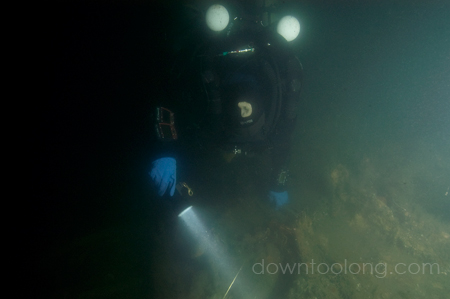Thanks to all for the information. I think for the upcoming trip, I'll stick with guided night dives and just have fun.
It depends more on your instructor. There are a few light signals and a few protocols, but mostly, night diving is just incredibly fun. Take two lights. A circle means "OK". Back and forth means not "OK". Shine your light on your fingers to signal other signs. Never shine your light in anyone's eyes or a critter's eyes. Turn your light off just before you get on the ladder.
There you go he just gave you the course for free.
Heh, awesome!!
My first night dive was part of the AOW course. As I recall, the instructor took time to explain a number of things that I would not have known had I just jumped in with flashlight in hand and winged it. For example, he explained how to signal with the light, and what else to do and not do with the light, as well as various options for lights. There was also some discussion of what we might see, how to stay together, how to avoid getting disoriented, etc. It could all be "taught" in 20 minutes. I do not believe formal instruction is necessary before undertaking one's first night dive, but I do believe one should get some sort of minimal instruction on night diving before just jumping in for the first time, whether that instruction is from a mentor or dive buddy or whomever.
I'm hoping to do a night dive as part of my AOW as well. I think after the guided holiday dives and the AOW night dive I should be able to figure out if I need to continue on to do the specialty or not.
Losing visual reference is another -- but it's much worse at night than in low viz, because there is no light gradient to help you orient to up and down.
Good to know, I didn't think of that all. Maybe I can use bubbles from my regulator to orient?
What are your future diving plans. Not next trip but future plans.
If you plan to always night dive with a DM guide, then the course is definitely optional although you might benefit from reading the manual without the course. I have done that for several courses.
However, if you plan for you and a buddy to go off night diving on your own, then knowing the material in the course would be more beneficial. There are things that might not occur to you on your own, such as marking your exit.
Future plans for diving? I don't think I'll be doing a lot of night diving locally - I imagine most of it would be on vacation with a guide. Even for local dives, I doubt my buddy/wife and I will do night dives without a guide, at least for the first few.
I'm definitely going through the Night Diving chapter in the AOW book. I glanced at it when I got the book and it seems to cover all the protocols and techniques mentioned above. I doubt there will be that much more required information in the Night Diving Specialty manual - this is just from my experience comparing the Navigation chapter in the AOW manual with the Navigation Specialty manual.
Best,
elgoog
---------- Post added October 1st, 2014 at 03:33 PM ----------
(OP - do you think it would be easier to locate and recover a light that you dropped while exiting the water if it were OFF, or if it were ON?)
That's not a fix. There'll be plenty of light on the boat. TURN THE LIGHT OFF before you get on the ladder. No need to night blind your captain and crew.
Yeah, on a boat I wouldn't need my own light on - just need to remember to have it clipped on to my harness and not holding it in my hand. I've dropped snorkels that way which, luckily, didn't sink far enough before my wife grabbed them. Losing a light like that would suck.
An "on" light might be easier to find underwater but the boat dives I've done were in at least 60-70fsw. I don't see anyone going back down for it at the end of a dive. For shore dives, it totally makes sense to me to keep the light on until you're totally out of the water and in a safer spot.
On a side note, I do have some experience retrieving dropped flashlights from underwater. Not in SCUBA but while fishing.
I was night fishing for largemouth bass on my kayak and trying to take a photo before release. The flashlight was in my mouth, bass and rod in one hand and camera in the other. The largemouth seemed fairly ticked off at the amount of time I was taking to let him get back into the water and did an enthusiastic tail flip which slapped me right across my face. Bass, rod and light ended up in the drink - the last 2 I managed to retrieve from about 12ft down, which would not have been possible if the light was off. I didn't log that dive as it was shallower than 15ft and less than 15min in duration.
Best,
elgoog





